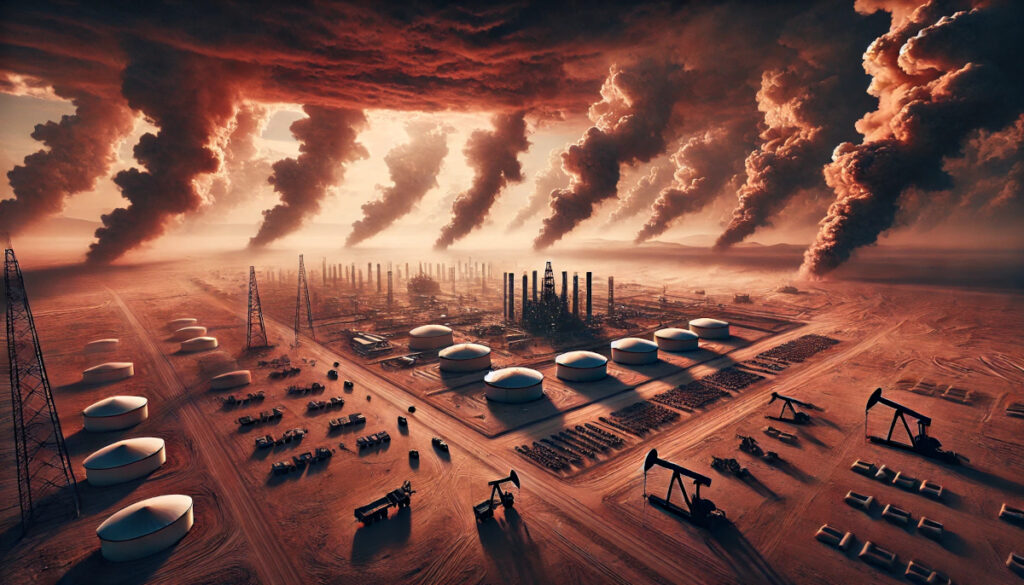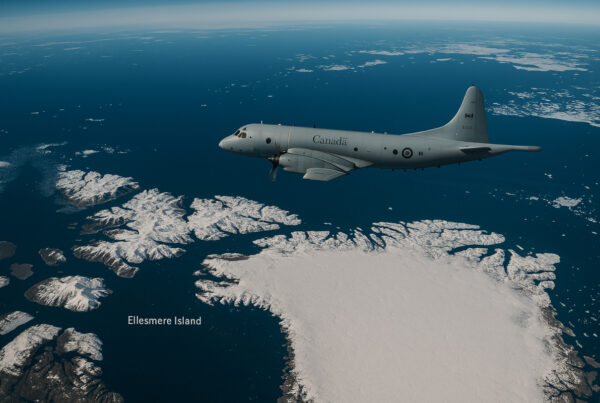
The vulnerability of Iranian oil infrastructure amidst conflict (DALL-E)
Over the past month, tensions between Iran and Israel have escalated dramatically. A series of back-and-forth attacks has pulled the two nations closer to the edge of direct confrontation. This conflict, already marked by rocket launches, airstrikes, and intelligence operations, reached a new peak following an Israeli airstrike on Iranian military installations. In retaliation, Iranian Supreme Leader Ayatollah Ali Khamenei reportedly ordered Iran’s armed forces to prepare a reprisal attack on Israeli military sites.
This move is more than just another tit-for-tat in the ongoing proxy conflict between the two Middle Eastern powers. It signals Iran’s willingness to engage Israel directly, potentially drawing other regional and global powers into a larger, more destructive conflict. For Canadians, the implications of this escalating situation might not seem obvious, yet the potential impact on energy prices, regional stability, and global security could be significant.
The Potential Impact of Escalated Conflict on Oil Infrastructure
One of Iran’s most powerful geopolitical assets is its vast oil reserves, which serve as a critical component of the global energy supply chain. Oil production accounts for a substantial part of Iran’s economy, and any attack on its infrastructure would likely create ripple effects in oil prices and global markets. Given that Iran controls the Strait of Hormuz—a narrow channel through which around 20% of the world’s oil passes—an escalation that threatens this region would cause major disruption to the energy market.
If Israel intensifies its military strikes, and Iran’s response becomes more aggressive, both sides could target strategic assets. In this worst-case scenario, Iran’s oil infrastructure may come under heavy attack, potentially causing production capacity to plummet. Key facilities like the Abadan and Bandar Abbas refineries, along with major oil export terminals, could face direct assaults. A collapse of these facilities would cut off a substantial amount of crude oil from the global market, triggering a surge in oil prices that would reverberate globally.
How This Could Impact Canada and Canadians
Rising Fuel Costs
Canadians are already experiencing relatively high gasoline prices, and any instability in the Middle East would only exacerbate this trend. Given that Canada is part of a global oil market, an upward spike in crude oil prices would directly increase the cost of gasoline, heating oil, and other petroleum products. Prices at the pump could jump significantly, affecting the daily lives of millions of Canadians.
Canadian industries that rely on fuel, such as transportation, agriculture, and manufacturing, would also face cost increases, potentially raising the price of goods and services nationwide. For many Canadian families already feeling the pinch from inflation, the additional strain of rising fuel costs would be challenging.
Economic Uncertainty and Inflation Pressures
As oil prices soar, inflationary pressures across the economy would intensify. The Bank of Canada would be in a difficult position, having to navigate inflation management while trying not to slow down economic growth. Any increase in interest rates to combat inflation could affect Canadian mortgage holders, many of whom are already strained by high housing costs. Canadians would see inflation’s effects in multiple areas, from food prices to household goods, as the costs of production and transportation would inevitably rise.
Impact on Trade and Canadian Exports
A Middle Eastern conflict could disrupt major shipping lanes, particularly around the Strait of Hormuz. Since Canada exports a range of goods globally, including energy, agricultural products, and technology, these disruptions would increase shipping costs and add new challenges to an already strained supply chain. Canadian companies that rely on imports could also see delays, creating shortages and raising costs in the domestic market.
Strain on Canadian Allies and Military Commitments
The geopolitical instability in the Middle East would also place additional demands on Canada’s allies, particularly the United States, which has longstanding commitments to Israel. Should the U.S. increase its involvement, Canada might face pressure to contribute resources or support to the region, be it through military presence, intelligence collaboration, or humanitarian aid.
Canada’s military and humanitarian commitments globally are already stretched thin. Any escalation would force Canadian policymakers to balance national priorities with international obligations. The potential for regional conflict also raises security risks for Canadians and Canadian companies operating abroad, especially in regions with strong energy-sector ties to the Middle East.
Wider Implications for Global Stability
The impact of such a conflict would extend beyond Israel and Iran, creating volatility throughout the Middle East and beyond. Regional allies like Saudi Arabia and the UAE would likely get involved or see internal pressures to respond, creating a broader geopolitical rift. Escalating violence could also empower non-state actors, such as Hezbollah and various Iraqi militias, to conduct attacks against Israeli or Western interests, adding another layer of complexity and risk.
For Canada, an increasingly polarized Middle East could mean strained diplomatic relations and limited access to previously stable trade routes. Canadian peacekeeping missions and diplomatic initiatives in other regions could also face complications, as resources and global attention shift to this intensifying crisis.
What Could Canada Do?
Canada, as part of the global community, would face difficult choices if Iran and Israel’s conflict escalates. Diplomatic channels would need to be leveraged immediately to advocate for a peaceful resolution. Working with allies and international organizations like the United Nations, Canada could press for ceasefire negotiations or support international efforts aimed at de-escalating the situation.
At a domestic level, Canadian policymakers would need to consider strategies for stabilizing the economy amid fluctuating oil prices. The government might explore emergency measures such as strategic oil reserves or subsidies for essential industries. In the longer term, Canada’s reliance on a stable global oil market emphasizes the importance of diversifying its energy sources, such as investing further in renewable energy.
A Conflict with Global Consequences
As the situation between Iran and Israel continues to unfold, it’s clear that the implications could extend far beyond the Middle East. A direct military conflict involving Iran’s oil infrastructure would have a seismic impact on global markets, with Canadians likely to feel the aftershocks in their daily lives, from fuel prices to inflation and international relations.
Canada’s role in advocating for peace and preparing for economic challenges will be crucial. By balancing diplomacy with readiness, Canada can better navigate the turbulent waters of global instability and protect Canadian interests.
For Canadians watching this situation, awareness of the broader implications and possible consequences is essential, as the events of today could have far-reaching effects on life in Canada in the coming months.








